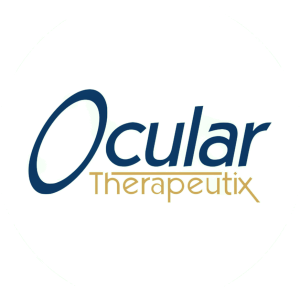Ocular Therapeutix™ Announces First Patients Enrolled in Phase 3 SOL-R Wet AMD Study
Rhea-AI Summary
Ocular Therapeutix (NASDAQ: OCUL) has initiated patient enrollment in the Phase 3 SOL-R clinical trial for AXPAXLI™, evaluating its efficacy in treating wet age-related macular degeneration
SOL-R complements the ongoing SOL-1 trial, focusing on repeat dosing to reflect real-world treatment scenarios. It will initially enroll patients ineligible for SOL-1, later expanding to include treatment-naïve patients or those recently diagnosed with wet AMD. The study design incorporates multiple aflibercept loading doses and evaluates patients to limit retinal fluid fluctuations, potentially increasing the likelihood of success.
Positive
- Initiation of Phase 3 SOL-R trial for AXPAXLI in wet AMD treatment
- Large-scale study with 825 patients to evaluate efficacy and dosing regimen
- Potential for extended dosing intervals (every 6 months) compared to current standard of care
- Complementary to ongoing SOL-1 trial, providing comprehensive clinical data
- Study design incorporates measures to potentially increase success likelihood
Negative
- Results and efficacy of AXPAXLI in Phase 3 trials are yet to be determined
- Potential competition from existing and new therapeutics in the wet AMD market
News Market Reaction
On the day this news was published, OCUL gained 1.35%, reflecting a mild positive market reaction.
Data tracked by StockTitan Argus on the day of publication.
SOL-R evaluates repeat AXPAXLI™ dosing for wet age-related macular degeneration (wet AMD)
Global non-inferiority study comparing AXPAXLI, dosed every six months, to 2 mg aflibercept every eight weeks
BEDFORD, Mass., July 30, 2024 (GLOBE NEWSWIRE) -- Ocular Therapeutix, Inc. (NASDAQ: OCUL, “Ocular”, the “Company”), a biopharmaceutical company committed to improving vision in the real world through the development and commercialization of innovative therapies for retinal diseases and other eye conditions, today announced that the first patients have been enrolled in the Phase 3 SOL-R clinical trial evaluating repeat dosing of AXPAXLI™ (axitinib intravitreal implant, also known as OTX-TKI) for the treatment of patients with wet age-related macular degeneration (wet AMD).
SOL-R is a global, 825-patient, non-inferiority study evaluating repeat dosing of AXPAXLI every six months (Q6M) compared to 2 mg aflibercept, dosed every eight weeks (Q8W) in patients with wet AMD. A third arm evaluating 8 mg aflibercept dosed Q6M is incorporated to ensure the study is adequately masked. The trial is evaluating AXPAXLI versus the current standard of care under the “real world” requirements of a repeat-dosing regimen.
“Our first Phase 3 trial, SOL-1, is intended to show that AXPAXLI can safely and durably maintain visual acuity in patients with wet AMD. SOL-R is intended to build on that by providing physicians with important evidence regarding the potential to re-dose AXPAXLI every six months, which better aligns with a likely ‘real world’ experience,” said Pravin U. Dugel, MD, Executive Chairman, President and Chief Executive Officer of Ocular Therapeutix. “SOL-R will initially enroll patients who do not qualify to be randomized in SOL-1. Subsequently, SOL-R will be opened to direct enrollment of patients who are treatment naïve or diagnosed with wet AMD within three months prior to enrollment. Patients enrolled in SOL-R are similar to those enrolled in our successful U.S. Phase 1 study, with further enrichment through multiple aflibercept loading doses. Further, these patients are evaluated to limit retinal fluid fluctuations between visits prior to randomization, increasing our confidence in the study’s potential success.”
“There is increasing evidence that pulsatile VEGF suppression may result in OCT fluctuations that could lead to poor long term visual outcomes. Even with new therapeutics entering the wet AMD market, the need for a durable and sustained treatment is substantial for many of my patients. The SOL-R study is critically important because results from this large, repeat-dosing study may provide the retina community with insight on how AXPAXLI may be used in our practices,” said Arshad M. Khanani, MD, MA, FASRS, Director of Clinic Research at Sierra Eye Associates, Reno, Nevada. “Providing patients who do not qualify for SOL-1 randomization with an opportunity to enroll in the SOL-R study is a tremendous service to physicians and the patients they serve. Moreover, I appreciate that SOL-R is designed for AXPAXLI re-treatment at six months, which is in-line with how often I’d ideally like to see my wet AMD patients. That said, it is not uncommon to reschedule appointments, leaving more time in between visits. Fortunately, SOL-1 is designed to generate valuable evidence to determine the ultimate durability of a single AXPAXLI implant. Together, these trials aim to provide a comprehensive picture of the flexibility of dosing intervals to meet individual patient needs.”
About AXPAXLI
AXPAXLI™ (axitinib intravitreal implant, also known as OTX-TKI) is an investigational bioresorbable, hydrogel implant incorporating axitinib, a small molecule, multi-target, tyrosine kinase inhibitor with anti-angiogenic properties, being evaluated for the treatment of wet AMD, diabetic retinopathy and other retinal diseases.
About the SOL-R study
The Phase 3 SOL-R trial (NCT06495918) is designed to evaluate the safety and efficacy of AXPAXLI in a multi-center, double-masked, randomized (2:2:1), three-arm study that will involve sites located in the U.S. and the rest of the world. The trial is intended to randomize approximately 825 patients who are treatment naïve or diagnosed with wet AMD in the study eye within three months prior to enrollment.
The one-year, non-inferiority study reflects a patient enrichment strategy that includes multiple loading doses of aflibercept and monitoring to exclude those with significant retinal fluid fluctuations. In the first arm, patients will be randomized to receive a single dose of AXPAXLI at Day 1 and re-dosed at Week 24. In the second arm, patients will receive aflibercept (2 mg) on-label every 8 weeks. In a third arm, patients will receive a single dose of aflibercept (8 mg) at Day 1 and re-dosed at Week 24, aligned to the AXPAXLI treatment arm for adequate masking. Subjects in any arm meeting pre-specified rescue criteria will receive a supplemental dose of aflibercept.
The primary endpoint is non-inferiority in mean best corrected visual acuity (BCVA) change from baseline between the AXPAXLI and on-label aflibercept (2 mg) arms at one year.
About Wet AMD
Wet age-related macular degeneration (wet AMD) is a leading cause of severe, irreversible vision loss affecting approximately 14 million individuals globally and 1.65 million in the United States alone (2023 Market Scope® Retinal Pharmaceuticals Market Report). Wet AMD causes vision loss due to abnormal new blood vessel growth and hyperpermeability and associated retinal vascularity in the macula, which is primarily stimulated by local upregulation of vascular endothelial growth factor (VEGF). Without prompt and continuous treatment to control this exudative activity, patients develop irreversible vision loss. With proper treatment, patients may maintain visual function for a period of time and may temporarily regain lost vision. Challenges with current therapies include pulsatile, repeated intraocular injections, treatment-related adverse events and up to
About Ocular Therapeutix, Inc.
Ocular Therapeutix, Inc. is a biopharmaceutical company committed to improving vision in the real world through the development and commercialization of innovative therapies for retinal diseases and other eye conditions. AXPAXLI™ (axitinib intravitreal implant, also known as OTX-TKI), Ocular’s lead product candidate for retinal disease, is based on its ELUTYX™ proprietary bioresorbable hydrogel-based formulation technology. AXPAXLI is currently in Phase 3 clinical trials for wet age-related macular degeneration (wet AMD).
Ocular’s pipeline also leverages the ELUTYX technology in its commercial product DEXTENZA®, an FDA-approved corticosteroid for the treatment of ocular inflammation and pain following ophthalmic surgery and ocular itching associated with allergic conjunctivitis, and in its product candidate PAXTRAVA™ (travoprost intracameral implant or OTX-TIC), which has completed a Phase 2 clinical trial for the treatment of open-angle glaucoma or ocular hypertension.
Follow us on our website, LinkedIn, or X.
The Ocular Therapeutix logo and DEXTENZA® are registered trademarks of Ocular Therapeutix, Inc. AXPAXLI™, PAXTRAVA™, ELUTYX™, and Ocular Therapeutix™ are trademarks of Ocular Therapeutix, Inc.
Forward-Looking Statements:
Any statements in this press release about future expectations, plans, and prospects for the Company, including the development and regulatory status of the Company’s product candidates; the timing, design, and enrollment of the Company’s SOL-1 Phase 3 clinical trial of AXPAXLI (also called OTX-TKI) for the treatment of wet AMD; the timing, design, and enrollment of the Company’s SOL-R Phase 3 clinical trial of AXPAXLI; the Company’s plans to advance the development of AXPAXLI and its other product candidates; the potential utility of any of the Company’s product candidates; and other statements containing the words “anticipate”, “believe”, “estimate”, “expect”, “intend”, “goal”, “may”, “might”, “plan”, “predict”, “project”, “target”, “potential”, “will”, “would”, “could”, “should”, “continue”, and similar expressions, constitute forward-looking statements within the meaning of The Private Securities Litigation Reform Act of 1995. Actual results may differ materially from those indicated by such forward-looking statements as a result of various important factors. Such forward-looking statements involve substantial risks and uncertainties that could cause the Company’s preclinical and clinical development programs, future results, performance or achievements to differ significantly from those expressed or implied by the forward-looking statements. Such risks and uncertainties include, among others, the timing and costs involved in commercializing DEXTENZA or any product or product candidate that receives regulatory approval; the ability to retain regulatory approval of DEXTENZA or any product or product candidate that receives regulatory approval; the initiation, design, timing, conduct and outcomes of ongoing and planned clinical trials; the risk that the FDA will not agree with the Company’s interpretation of the written agreement under Special Protocol Assessment for the SOL-1 trial; the risk that even though the FDA has agreed with the overall design of the SOL-1 trial, the FDA may not agree that the data generated by the SOL-1 trial supports potential marketing approval; uncertainty as to the FDA’s view of the Company’s proposed design for the SOL-R trial; uncertainty as to whether the data from earlier clinical trials will be predictive of the data of later clinical trials, particularly later clinical trials that have a different design or utilize a different formulation than the earlier trials, or whether preliminary or interim data from a clinical trial will be predictive of final data from such trial; availability of data from clinical trials and expectations for regulatory submissions and approvals; the Company’s scientific approach and general development progress; uncertainties inherent in estimating the Company’s cash runway, future expenses and other financial results, including its ability to fund future operations, including clinical trials; the Company’s existing indebtedness and the ability of the Company’s creditors to accelerate the maturity of such indebtedness upon the occurrence of certain events of default; the Company’s ability to enter into strategic alliances or generate additional funding on a timely basis, on favorable terms, or at all; and other factors discussed in the “Risk Factors” section contained in the Company’s quarterly and annual reports on file with the Securities and Exchange Commission. In addition, the forward-looking statements included in this press release represent the Company’s views as of the date of this press release. The Company anticipates that subsequent events and developments may cause the Company’s views to change. However, while the Company may elect to update these forward-looking statements at some point in the future, the Company specifically disclaims any obligation to do so, whether as a result of new information, future events or otherwise, except as required by law. These forward-looking statements should not be relied upon as representing the Company’s views as of any date subsequent to the date of this press release.
Investors & Media
Ocular Therapeutix, Inc.
Bill Slattery
Vice President, Investor Relations
bslattery@ocutx.com








